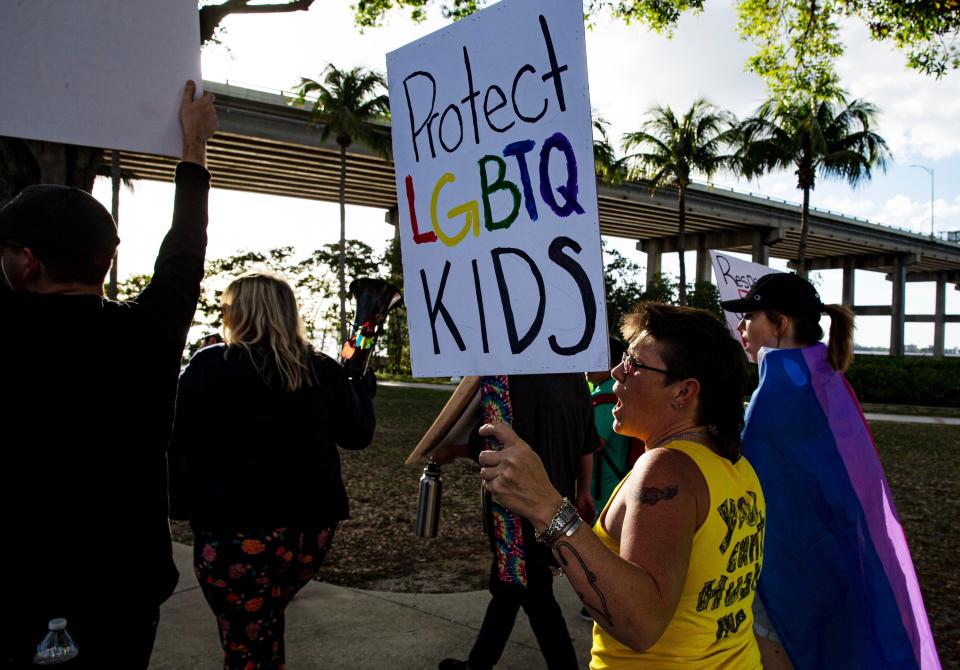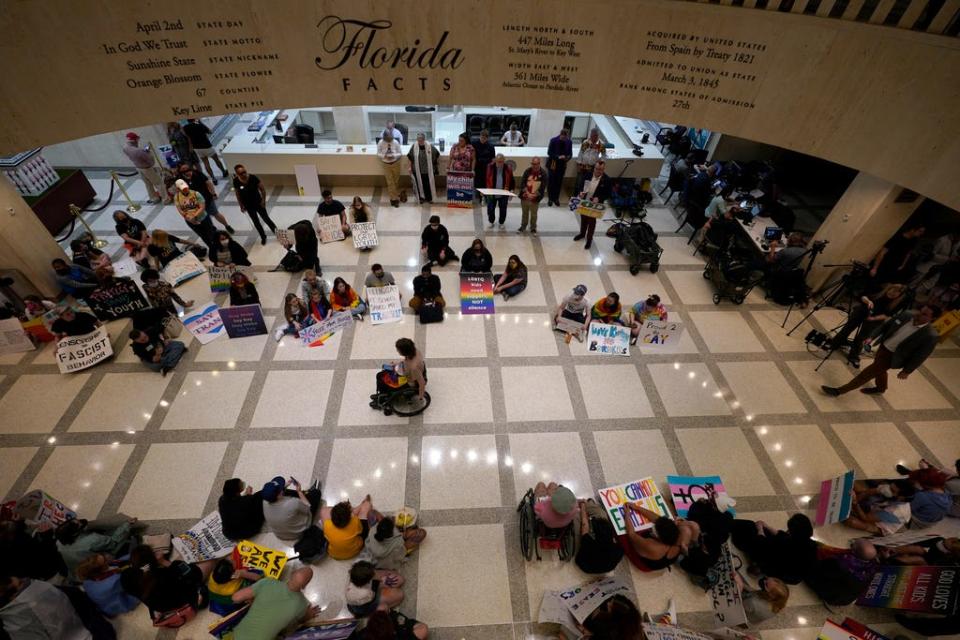Florida's 'Don't Say Gay' bill sparked national backlash. But more legislation is brewing.
Florida's "Parental Rights in Education" bill, which would restrict classroom discussions about LGBTQ people, is just the tip of the iceberg for similar legislation across the country, data shows.
Florida's bill has inspired national backlash, but it contains language similar to many other bills – branded "Don't Say Gay" legislation by critics. Those proposed laws are currently in various stages of moving through state legislatures.
The barrage of legislation represents a widespread attack against LGBTQ people and their allies, according to policy experts. Young people, who identify as LGBTQ at higher rates than older generations of Americans, stand to be harmed the most by the bills, experts said.
Policies prohibiting schools from teaching students about LGBTQ issues have been on the books in a few states for decades, although several states rolled back their policies in recent years. But the advancement of bills in Florida and over a dozen other states marks an unprecedented push toward the most restrictive type of laws – ones that ban even the mention of LGBTQ people in some cases.
“We’ve seen this incredible growth this year in particular and I think we’re really seeing a coordinated political attack and politicians are using LGBTQ people … as a wedge issue to gain political points and certainly undermine education and how children learn best," said Naomi Goldberg, deputy director at the Movement Advancement Project (MAP), which publishes nationwide LGBTQ data.
Eighteen other states have seen the introduction of bills similar to Florida's this year alone, according to MAP and the Equality Federation, which released a report Wednesday documenting hostile school and curriculum bills. Texas, Louisiana, Mississippi and Oklahoma already have similar policies on the books from the 1990s.
Many of this year's pieces of legislation are called "parental rights" bills, but critics said the name distracts from stipulations that would harms kids for whom school is the only place they feel comfortable talking about LGBTQ issues.
Among those bills are ones requiring parents to "opt-in" for students to learn about certain topics, giving families power to make decisions about learning that are typically made by certified educators and counselors, Goldberg and MAP policy researcher Logan Casey said.
“We end up in a situation where you have politicians who are not educators making decisions about what happens in the classroom, and it really does tie the hands of local school boards as well as state school boards to make those decisions in an informed and public way," Goldberg said.
There is no one version of a "Don't Say Gay" bill, according to experts at MAP. They all restrict discussions of sexual orientation and gender identity through a variety of different means.
In the case of the Florida bill, the legislation includes intentionally broad and vague language and gives parents the right to sue school districts and individual teachers. The effect, advocates say, is that students and teachers will likely fear discussing or asking questions about anything that could be perceived to be prohibited.

Florida's bill isn't even the most restrictive, because other state bills would prohibit instruction in more grade levels.
WATCH: Florida lawmakers pass 'Don't Say Gay' bill, send to Gov. DeSantis to sign
DISNEY: CEO apologizes for 'Don't Say Gay' bill response
Madelynn Duggar, a high school senior in Tallahassee, Fla., who helped organize student protests against the bill at the capital, said she's concerned about people minimizing the toll anti-LGBTQ legislation and political rhetoric are taking on students.
“Some people have told me that the backlash against being gay is like, not that big or whatever, but in my own personal life I have experienced significant, monumental backlash," said Duggar, who said she was banned from church camp for participating in the protests. "The agenda against LGBTQ people is alive and well."
By discouraging kids from seeking out guidance about LGBTQ issues at school, Florida's bill is “isolating them from the help they need," said Heron Greenesmith, a legal expert cited in the MAP report. For that reason, the "Don't Say Gay" framing "far underestimates the impact of this bill," Greenesmith said.
"So many of these pieces of legislation right now, they are all focused around reducing youth’s access to supportive resources and supportive adults," Greenesmith said.
Half of LGBTQ youths in the U.S. said they feel affirmed at school, compared to only a third who said they feel affirmed at home, according to the Trevor Project's 2021 national survey on LGBTQ youth mental health.

What does Florida's 'Don't Say Gay' bill say?
Florida's bill prohibits "classroom discussion" and "instruction" about sexual orientation or gender identity, according to the bill.
The bill fully prohibits the instruction in kindergarten through grade 3, even though it's not taught in those grades. It also prohibits instruction on sexual orientation and gender identity "in a manner that is not age appropriate or developmentally appropriate" in all other grades.
WHAT IS TRUE IN REALITY: The importance of LGBTQ-inclusive sex education in schools
THEY'RE THE SAME THING: Parents want kids to learn about ongoing effects of slavery – but not critical race theory
But the bill includes no information about what specific discussions, materials, historical facts or after-school clubs such as Gender & Sexuality Alliances (GSAs) would be prohibited. It’s also unclear whether a student would be prohibited from engaging in conversation with a teacher about using new pronouns or a different name in the classroom.
Florida's bill strips public schools of their longstanding, unofficial role as "community centers" for families, said Kyleigh Klein, an Austin, Texas, mental health therapist with online platform Brightline, who specializes in helping LGBTQ youths and their families.
“There are a lot of amazing organizations within the schools, but (the bill) is completely erasing an entire state of support for these kids and for the parents who don’t know how to talk about this, how to navigate this with their kid," Klein said.
One stipulation of the bill could require teachers to notify parents of any changes in a student's "health or well-being," which could include changes in sexual orientation or gender identity, LGBTQ advocates said. Advocates said that will put kids who come from unsupportive families in harm's way, by "outing" them to their parents.
The bill also gives parents the right to sue school districts and individual teachers if prohibitions are violated or perceived to be violated, and the school district would be forced to "bear the costs" of a lawyer appointed by the state.
Because the bill's language on prohibited discussions is so unclear, experts said, students and teachers will likely fear discussing or asking questions about anything perceived to be prohibited.

EQUALITY ACT PUSH: Kids aren't learning LGBTQ history. The Equality Act might change that.
PROBE BLOCKED: Texas judge blocks child abuse investigation of family for providing gender-affirming medical care
A 'ripple effect of secrecy'
Mental health experts said the bills will cause students to feel shame, stigma and fear about questioning their sexuality or gender or having LGBTQ parents, leading to increased depression and emotional insecurity.
"It’s a snowball effect of what it’s going to cause and I hate to see what that’s going to look like," Klein said. "This would take away the ability for a child to be authentic in who they are and cause that ripple effect of secrecy and erasure of who they are."
One-third of LGBTQ youth said they've experienced physical harm, which includes bullying, because of their sexual orientation or gender identity, according to 2020 data from the Trevor Project.
Klein said she's worried because conversations and questions about gender identity and pronouns usually come up for kids either at school or at home, depending on where they feel more comfortable.
“That’s typically one of the first things whenever a child or teen is kind of going through their gender journey, talking about pronouns and names is one of the first ways we can affirm them," she said.
Because Florida's "Don't Say Gay" bill would prohibit LGBTQ-inclusive sexual education, infectious disease experts said it will also impede effective responses to HIV and STI prevention.
Duggar, the Florida student, said she feels like her state's bill will make school "10 times harder" for LGBTQ kids.
“It would make school like a hostile war zone for LGBTQ and it’s already rough,” she said. "If you don’t feel accepted at school, if you don’t feel accepted at home, where do you feel accepted?" she said.
This article originally appeared on USA TODAY: Florida one of many states moving forward with 'Don't Say Gay' bills

